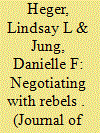| Srl | Item |
| 1 |
ID:
172180


|
|
|
|
|
| Summary/Abstract |
What shapes the types of services terrorist and insurgent groups provide? Research on these organizations provides mounting evidence that understanding the nonviolent strategies of violent groups is critical to a complete picture of conflict dynamics. We add to this work, using a longitudinal measure of terrorist service provision coverage across a number of service sectors to evaluate hypotheses concerning the drivers of terrorist service provision to understand which services groups provide. Here, we are interested in understanding patterns of service provision: which groups provide services where, and whether and how that decision is reactive to the state context. Specifically we look to see if groups are likely to provide services as complements or substitutes to the state in the competition for constituents. We find terrorist groups challenge the state in service provision in less capital-intensive sectors, such as education, while avoiding competition in more capital-intensive sectors, such as healthcare. We also find service provision varies over a group’s lifetime, likely in response to counterterrorism efforts. As a group ages and strengthens, it is also more likely to provide a broader array of services. Finally, we observe that service-providers tend to have longer lifespans.
|
|
|
|
|
|
|
|
|
|
|
|
|
|
|
|
| 2 |
ID:
153658


|
|
|
|
|
| Summary/Abstract |
When rebels provide social services, do they have more leverage negotiating the terms of a peace deal? The literature suggests service-providing groups may, on average, have a wider base of support and a more centralized organizational structure. We argue that these features deter potential spoilers from breaking away from the organization during negotiation processes. This, in turn, makes governments more willing to enter negotiations since the threat from spoilers is smaller. Thus, compared to nonproviders, service-providing rebels are more likely to engage in negotiations and these processes are likely to be more stable. This article analyzes these propositions by gathering service provision data on nearly 400 rebel groups and their involvement in and behavior during peace talks. It also serves as an introduction to a larger project about the implications of rebel service provision on conflict outcomes.
|
|
|
|
|
|
|
|
|
|
|
|
|
|
|
|